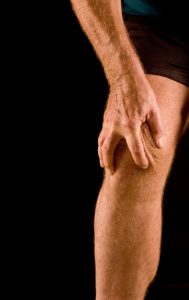Table of Contents
 The two most common misconceptions about ACL injuries is that only athletes can tear their ACL, and you can only tear your ACL as a result of direct contact. In reality, most ACL tears are not contact related, and anyone can injure their ACL, regardless of athletics. Sure, while people who participate in high-risk, contact-heavy sports have a greater chance of tearing their ACL, it’s important to know that anyone is susceptible to a tear.
The two most common misconceptions about ACL injuries is that only athletes can tear their ACL, and you can only tear your ACL as a result of direct contact. In reality, most ACL tears are not contact related, and anyone can injure their ACL, regardless of athletics. Sure, while people who participate in high-risk, contact-heavy sports have a greater chance of tearing their ACL, it’s important to know that anyone is susceptible to a tear.
What Is an ACL and How Does It Tear?
The anterior cruciate ligament (ACL) is one of four ligaments in the human knee, and its purpose is to help keep your tibia from sliding underneath your femur. ACL tears have numerous causes, including hyperextension of your leg, twisting your knee, sudden changes in direction, hard and direct contact to the knee, or a sudden stop in movement. Car accidents, work injuries, falls, and sports, are some common situations that can lead to an ACL tear.
ACL Tear Symptoms
Symptoms of an ACL tear are immediate and easy to recognize. If you tear your ACL, you’ll know it. But here are some key signs to look out for.
- Loud Popping Noise: It’s common to hear and feel a pop the moment you tear your ACL. A ligament is a strong band of tissue connecting two bones. Tearing an ACL will release tension, causing a distinctive sound.
- Sudden Intense Pain: There are more nerves in your knee than any other joint in your body. Any injury in that area, including tearing your ACL, will cause intense and immediate pain.
- Noticeable Swelling: When you tear your ACL, there is an increase in blood and other fluids in that area. Swelling will begin immediately and increase over time. To combat the swelling, put ice on the affected knee as soon as you can.
- Inability to Put Weight on the Knee: Once your ACL tears, it will be difficult, if not impossible, to put weight on your knee. Pivoting on one leg, walking downstairs, or going from a sitting to standing position will cause you extreme pain.
- Immobility: Due to fluids flooding your knee, an ACL tear will make it difficult to straighten your leg. Other movements will be severely restricted as well.
What To Expect From an ACL Tear
If you suspect that you’ve torn your ACL, go to the doctor immediately. Waiting for the pain to go away will only make the condition worse. Your doctor will run various tests to determine the severity of your injury. These tests will most likely result in you receiving an MRI, which will assess the full damage and assist in determining the best course of treatment.
Treatment For an ACL Tear
Depending on the severity of the damage, there are numerous treatment options available. For a partial ACL tear, your physician may recommend physical therapy, which will strengthen your knee and restore stability. Physical therapy is also a viable choice if you don’t play sports or do things that involve pivoting or sudden stopping. If you do lead an active lifestyle, then surgery may be your best option for an ACL tear. During surgery, the doctor will remove your torn ACL and make another one out of a graft from your hamstring, patellar, or a cadaver tendon.
Post Surgery
Physical therapy will be needed to get your knee fully functioning again. And even after your knee begins to feel better, it’s important to remain in physical therapy for the time recommended by your physician. Long-term physical therapy is imperative for the proper healing of your new graft.
ACL injuries do increase the risk of knee osteoarthritis, which causes the cartilage to deteriorate, leading to pain and requiring further treatment. To prevent this, you must minimize your level of movement during your recovery. Successful recovery from an ACL tear can take up to a year. You should have your knee examined by a physician before returning to physical activity to minimize the risk of reinjury.
Let Us Help You Recover
Countryside Orthopaedics has been delivering compassionate treatment to our patients for more than 25 years. Our facilities offer on-site physical therapy and X-ray services, and we have three board certified, fellowship trained orthopedic surgeons on staff. We take your well-being seriously and have built a reputation for excellence in our field. If you experience an ACL tear, contact us immediately and we will get you on the road to recovery.